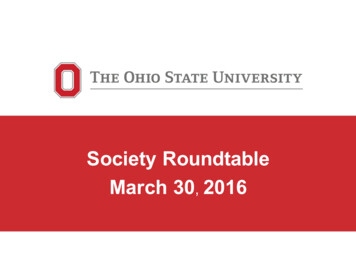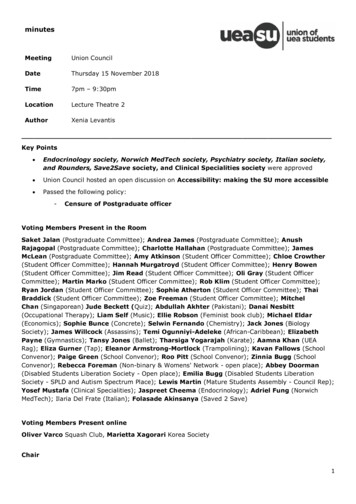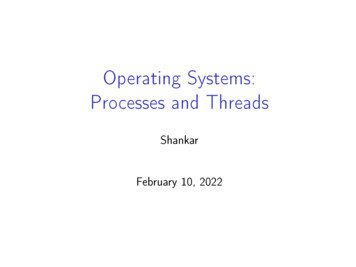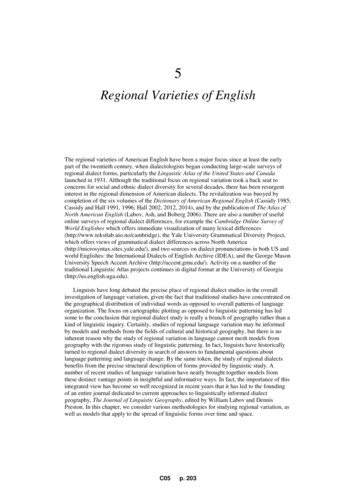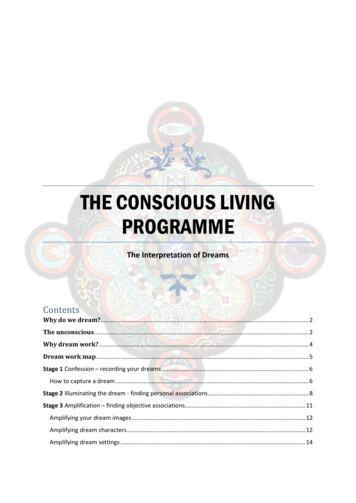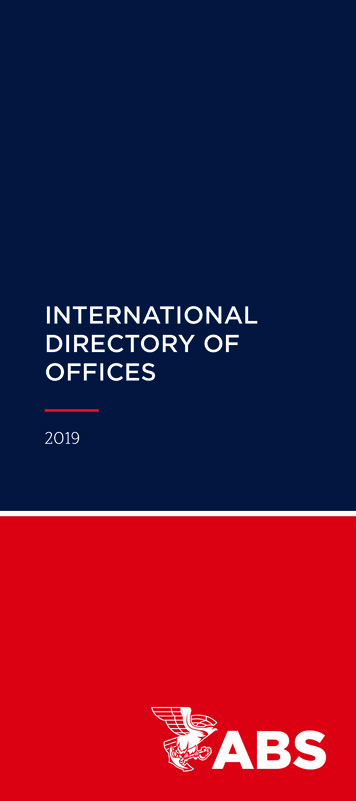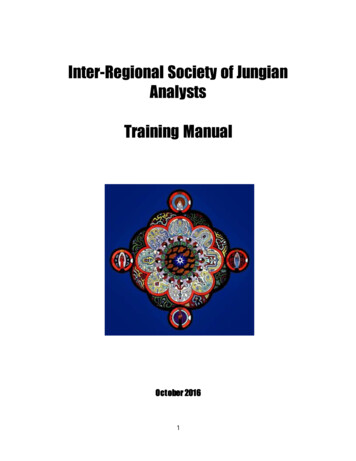
Transcription
Inter-Regional Society of JungianAnalystsTraining ManualOctober 20161
2
INTER-REGIONAL SOCIETY OF JUNGIAN ANALYSTSTRAINING MANUALTable of ContentsPageI. Training ProgramA. OverviewB. Subjects CoveredC. Graduation Requirements7II. Admission GuidelinesA. General ConsiderationsB. PrerequisitesC. Admissions ProceduresD. Application MaterialsE. Transfers to the IRSJA11III. Candidate GuidelinesA. All Candidates1. Personal Analysis during Training2. Local Training Seminar3. IRSJA Review Committee4. IRSJA Meetings5. IRSJA Training DocumentsB. Pre-Control Stage1. Case Consultation2. Clinical Experience3. Preparing for the Propaedeuticum Examination4. Propaedeuticum Examinationsa. History and Development Examb. Complex and Psychopathology Examc. Dream Examd. Archetypal Exame. Written Exam5. Retaking Examinations6. AdvancementC. Control/Diploma Stage1. Individual Case Consultation and Case Colloquia2. Diploma Examinationsa. Written Case Reportsb. Thesis3. Graduation4. Diploma and Certification158121331617181920212223252728
IV. General Training InformationA. Dues and Fees1. Annual Dues2. Seminar Tuition3. Analysis/Case Consultation Fees4. Examination Fees5. GeneralB. Candidate Transfers between SeminarsC. Telecommunications PolicyD. Leave of AbsenceE. Candidate WaiverF. Conflict ResolutionG. TerminationH. Modification of Training RequirementsI. Applicable Policies29V. Dual RelationshipsA. Personal AnalystB. ExaminationsC. TeachingD. Personal RelationshipsE. EnmityF. General34VI. Faculty GuidelinesA. IRSJA TrainingB. IRSJA Training CommitteesC. Admissions CommitteeD. Training CommitteeE. IRSJA Director of TrainingF. Review CommitteesG. Propaedeuticum Examination Committees1. Oral Examination Committees2. Written Examination CommitteeH. Diploma Examination CommitteesI. Additional Faculty Requirements1. Telecommunications Policy2. Individual and Control Case Consultation of Control Candidates3630313233354373839404142
VII. Local Training Seminar GuidelinesA. Faculty1. Core Faculty2. Adjunct Faculty3. Visiting FacultyB. InsularityC. Dual RelationshipsD. Seminar ParticipantsE. Relationship with the IRJSAF. Relationship between Training Committee and Local Training SeminarG. Reports1. Reports to the Society2. Reports to Review Committees3. Reports to Admissions CommitteeH. Establishment and Suspension1. Establishment2. Suspension3. :D:E:F:G:H:I:Application for AdmissionsCandidate WaiverCandidate Dues and FeesTelecommunications Policy and WaiversIRSJA Training TranscriptIRSJA Training Transcript InstructionsCandidate Requirements in TrainingGuidelines for Diploma Exam ChairsAnnual Training CalendarNotes5444546474849505152535761656769
6
I. TRAINING PROGRAMA. OverviewThe Training Program of the Inter-Regional Society of Jungian Analysts (IRSJA) is a postgraduate program which offers training in Jungian Analytical Psychology to professionalsin mental health and allied fields. Since Inter-Regional Society members live and workthroughout North America, the training program is able to meet the training needs ofprofessionals who live at a distance from available Jungian training centers in the UnitedStates.To become a candidate, applicants are required to possess at least a master’s degree.Most applicants come from clinical fields, such as medicine, psychiatry, psychology,counseling, nursing, or social work. Applicants from non-clinical fields are consideredfor admission to the training program if the potential for understanding depthpsychology is demonstrated and an ability to work with people in an analytic setting ispresented.Training takes place in IRSJA Local Training Seminars and semi-annual IRSJA Societymeetings. Candidates are required to be affiliated with an IRSJA Local Training Seminarthroughout training. Areas of study include theoretical foundations of AnalyticalPsychology, archetypal material, fields related to Analytical Psychology and the practic eof Jungian analysis. Candidates are expected to be in individual analysis with a Jungiananalyst throughout their training as required by the training manual.Graduates of the IRSJA’s Training Program receive a diploma in Analytical Psychology. Agraduate is eligible to apply for membership in the IRSJA and to other Jungian societiesand institutes. On acceptance into the membership of a society, the graduateautomatically becomes a member of the International Association of AnalyticalPsychology (IAAP).Graduation from the IRSJA does not provide the legal right to practice psychoanalysis orpsychotherapy. Training candidates have a personal and ethical responsibility to acquirelegal status in the state in which he or she practices. Applicants will be required to sign astatement releasing the Society from any responsibility in this respect.B. Subjects CoveredTheoretical FoundationsBasic Principles of Analytical PsychologyStructure and Function of the PsychePsychological Types and FunctionsTheory of Dream Interpretation7
Individuation ProcessComplex TheoryThe Association ExperimentHistory of Analytical PsychologyComparative Study of Current Psychoanalytic TheoriesComparative Study of Newer TherapiesPsychopathologyDevelopmental PsychologyArchetypal MaterialDreams and FantasiesMythology and FolkloreInterpretation of Fairy TalesComparative ReligionsSymbolic FormulationsAlchemyFields Related to Analytical PsychologyAnthropology: Study of Traditional CulturesSocial PsychologyGroup DynamicsCreativity in the ArtsThe Practice of Jungian AnalysisPractical Use of Dream InterpretationActive Imagination and Other Creative TechniquesTransference and CountertransferenceCase SeminarsC. Graduation RequirementsThe minimum requirements for graduation from the IRSJA training program are: A minimum of 300 analytic hours with an IAAP member.200 analytic hours are required between admission and sitting for Diplomaexaminations, 25% of which may be performed using telecommunications ; aminimum of 100 of these required 200 hours must be with an IRSJA analyst.A minimum of 40 analytic hours is required per year during training, 25% ofwhich may be performed using telecommunications.Successful completion of oral and written Propaedeuticum exams.Control/Diploma candidates are required to have at least 100 hours of caseconsultation at a frequency of no less than two hours per month with an IRSJAanalyst. Up to 25% of control/diploma case consultation may be performedusing telecommunications.8
Successful completion of the Diploma exam on the candidate’s written cases.Successful completion of the Diploma exam on the candidate’s thesis.Payment in full of outstanding dues and fees.Additional requirements are set out at the beginning of the sections of this manual devoted toeach stage of training.9
10
II. ADMISSIONS GUIDELINESA. General ConsiderationsThe IRSJA has no permanent headquarters. Training takes place in Local TrainingSeminars located throughout the United States, at semi-annual Society meetings and intraining analysis and supervision arranged by the candidate.Potential applicants are required to spend a pre-application period of at least six monthsin an IRSJA Local Training Seminar. The currently available seminars are listed on theIRSJA website: irsja.org. When a seminar participant wishes to apply for the IRSJAtraining program, screening interviews are conducted by IRSJA Local Training Seminaranalysts, who recommend the applicant to the IRSJA Admissions Committee. TheAdmissions Committee meets once each year, at the Spring Society meeting, tointerview and make admissions decisions for applicants to the training program.B. Prerequisites for Applying to the Inter-Regional Training ProgramApplicants are required to meet the following prerequisites: All applicants must possess at least a master’s degree. It should be noted that agraduate degree qualifying an applicant to practice psychotherapy in their statemust be obtained prior to entering the Control/Diploma Stage of training.One hundred hours of face-to-face personal analysis with an IAAP analyst beforeMarch 1 of the year of application. The applicant is expected to be in analysis atthe time of application and the 100 hours of analysis must have taken placewithin three years of application for candidacy.Participation in an IRSJA Local Training Seminar for a minimum of six months beforeapplication to the Inter-Regional Society. A letter of approval from the LocalTraining Seminar Coordinator is required in order for an applicant to have an IRSJAadmissions interview.The financial and personal resources to invest in training that may take from six toten years and cost at least 15,000 a year (costs of analysis and case consultation,seminar fees, travel and lodging for seminars and to semi-annual Society meetingsin various cities around North America).Legal authority to practice psychotherapy/analysis in the state or country ofresidence, except in states where, at the time of application for thepropaedeuticum, licensure is not required to see clients.Minimum age: 25 years.Submission of application (Appendix A) and supporting documents to the Directorof Admissions by March 1.11
C. Admissions ProceduresPotential applicants contact a Local Training Seminar Coordinator to interview to join thatSeminar. Names and contact information for Local Training Seminar Coordinators are on theIRSJA website. If accepted, the potential applicant must attend the seminar for a minimum ofsix months before submitting an application for training in the IRSJA Program.When the applicant is ready to proceed with application to the IRSJA, he or she contacts theLocal Training Seminar Coordinator to request an interview with the local seminar faculty. Ifthe applicant is approved, the Local Training Seminar Coordinator recommends to theAdmissions Director that the applicant be given admissions interviews at the IRSJA Springmeeting.In order to apply to the IRSJA, the applicant completes the application materials available onthe IRSJA website (www.irsja.org) and sends them to the Director of Admissions, no returnreceipt required, postmarked on or before March 1. The Director of Admissions will inform theapplicant of dates and times of IRSJA admissions interviews.An applicant admitted into the training program is assigned to an IRSJA Review Committee. TheReview Committee meets with the candidate at the IRSJA annual fall meetings.D. Application MaterialsThe following materials must be included in the application packet and sent together: IRSJA application form, downloaded from the website (IRSJA.org), completed, signedand notarized. (Appendix A)A recent black and white or color passport size photo.Academic transcripts (from college level).Curriculum vitae (three pages or less).An autobiographical statement (no more than three double-spaced pages, one-inchmargins and 12-point font). The last paragraph of the statement should be written byhand.Application fee of 500 ( 100 non-refundable and 400 refundable if the individualwithdraws from the admissions process before attending the interviews). Checks shouldbe made out to the Inter-Regional Society of Jungian Analysts.IRSJA Waiver for Prospective Trainees signed and notarized. (See Appendix B).Verification by the applicant’s analyst(s) of analytic hours. The analyst(s) should specifytotal hours that were face-to-face and/or by telecommunication during the 3 years priorto application.12
E. Transfers to the IRSJAA candidate seeking to transfer from another IAAP-approved Institute must be in good standingin that training program and apply to the Inter-Regional training program in the same way as anon-transfer applicant, beginning with being admitted to a Local Training Seminar. Transferapplicants and candidates are subject to the rules governing admissions and candidacy in thisTraining Manual.13
14
III. CANDIDATE GUIDELINESA. All Candidates1. Personal Analysis during TrainingCandidates are required to be in analysis throughout the course of training and are encouraged towork with both a male and female analyst.Interpersonal as well as intrapersonal knowledge is necessary for a mature approach toanalysis. A candidate may receive up to 50 hours credit toward the minimumrequirement of 300 hours of personal analysis in an analytic group with an IRSJA analyst.Two hours of group analysis count as one hour of personal analysis (for example, 60 hoursof group analysis will be counted as 30 hours of individual analysis).To protect the privacy of the analytic relationship, the candidate’s personal analyst(s) willbe excluded from all evaluative aspects of the candidate’s training. The personal analyst(s)shall have no input into an applicant’s application to the IRSJA training program other thanto report the number of analytical hours. The personal analyst(s) cannot function as a caseconsultant or evaluator of an analysand who is a candidate, or lead a case colloquium thatincludes their analysand as a participant. Also, candidates must not seek case consultationor analysis from their personal analyst’s spouse or partner.2. Local Training SeminarCandidates are required to be affiliated with a Local Training Seminar during the entirecourse of training. Candidates must follow the requirements of the specific Local TrainingSeminar with which they are affiliated and may be required to write theoretical papers andpresent clinical cases from time to time. Local Training Seminars may have requirements inaddition to the IRSJA requirements.Toward the end of each seminar year, the Local Training Seminar faculty meets with thecandidate, discusses the candidate’s training process, receives any candidate requestsregarding their training progress, and writes a report of their meeting. This report will alsosummarize evaluations submitted by the candidate’s case consultants, seminar instructors,and colloquia leaders. Analysts with dual relationships to the candidate are excluded fromthe evaluation. The Local Training Seminar Coordinator sends this report by September15th to the IRSJA Review Committee Chair, the candidate, and the IRSJA Director ofTraining.15
3. IRSJA Review CommitteeUpon admission to the IRSJA training program, candidates are assigned to an IRSJA ReviewCommittee, which advises, mentors, and supports the candidate’s training from admissionto graduation. The Review Committee is composed of at least three IRSJA analysts, two ofwhom will be senior analysts. A senior analyst is defined as one who has been certified forat least five years.Candidates meet with their Review Committee at each annual fall meeting of the Society.These meetings are an important aspect of the candidate’s training and provide a forumfor the candidate to discuss their accomplishments, examine their training progress, andaddress the challenges they face in training. The Review Committee seeks to obtain acomprehensive view of a candidate’s progress and offers specific guidance and assistancewith all aspects of the candidate’s training. In general, the candidate is responsible fordecisions about his or her progress through the training program. These decisions arebased both on issues of eligibility and readiness. The candidates will address these issueswith their Review Committees. However, Review Committee approvals may, under somecircumstances, be required as provided in this Training Manual under General Supervisionand Case Colloquia Guidance.In preparation for the annual Review Committee meeting, the candidate’s ReviewCommittee Chair may request in writing additional information related to the candidate’straining. This information may include, but is not limited to: Candidate’s Local Seminar Yearly ReportCandidate TranscriptVerification of personal analytic hoursVerification of case consultation hours and evaluative report from the supervisinganalystWritten requests from the candidatePersonal statement from the candidate about his/her training processAll guidance and advice from the candidate’s Review Committee are forwarded to theTraining Committee for review.4. IRSJA MeetingsCandidates are required to attend each annual spring and fall Society meeting. Candidatesprepare materials for and participate in seminars and case discussions, as well as develop asense of how the Society functions as a whole. Candidates, as a group, organize theirseminars and case discussions and decide upon presenters for each semi-annual meeting.16
In general, diploma examinations and the propaedeuticum examinations are administeredat the spring meeting with any propaedeuticum examination retakes at the fall meeting.Also at the fall meeting, all candidates, including those candidates on Leave of Absence, arerequired to meet with their Review Committees.Candidates are responsible for covering the costs of training activities at these meetings.5. IRSJA Training DocumentsThe IRSJA Training Transcript (Appendix E and Appendix F) is to be used throughout thetraining process. The Transcript provides the candidate’s Review Committee, the LocalSeminar Coordinator, and the Training Committee with a comprehensive and up-to-daterecord of the candidate’s training. The Training Transcript originates from and ismaintained by the candidate. The training transcript is submitted on an annual basis forthe previous analytic year (June 1 – May 31).All Pre-Control candidates submit their training transcript, case consultation evaluations,confirmation of case consultation hours, confirmation of analytic hours, and a PersonalStatement to the candidate’s Local Training Seminar Coordinator (LTSC). The LTSC isresponsible for verifying that the information on the transcript is correct. The transcriptand documentation are sent to the IRSJA Director of Training, who will send all necessarydocuments to the Review Committee Chair.Control/Diploma candidates who passed the propaedeuticum examinations in that analyticyear submit their training transcript, case consultation evaluations, confirmation of caseconsultation hours, confirmation of analytic hours, and a Personal Statement to thecandidate’s Local Training Seminar Coordinator (LTSC). The LTSC is responsible forverifying that the information on the transcript is correct and will send all documents tothe IRSJA Director of Training.Once a candidate is in the Control/Diploma phase of training, they submit their trainingtranscript, case consultation evaluations, confirmation of case consultation hours,confirmation of analytic hours, and a Personal Statement to the IRSJA Director of Training(DoT). The DoT is responsible for verifying the transcript and will forward all documents tothe Review Chair. The DoT will use the verified training transcript as a resource documentwhen Control/Diploma candidates discuss formation of their Thesis and Cases committees.Candidates are responsible for ensuring that their yearly transcript and supportingdocumentation are submitted to either the Local Training Seminar Coordinator or theIRSJA Director of Training by June 15. Official transcripts are to be forwarded onlyelectronically. It is preferred that other documents related to a candidate’s training besent electronically, but submission by post will be accepted. For Pre-Control and newControl/Diploma candidates, the Local Training Seminar Coordinators, after verifying thetranscript, forward the transcripts to the DoT for inclusion in the permanent record.17
Candidates are not to send their training transcripts directly to their Review Committee.Candidates are required to maintain paper copies of all documents related to their training.The form for the yearly training transcript is found in Attachment E and on the IRSJAwebsite. IRSJA Training Transcript Instructions can be found in Attachment F.B. Pre-Control StagePre-Control stage is the period between admission to training by both a Local TrainingSeminar and the IRSJA and completion of the first set of exams (the Propaedeuticum). Thisphase of training will last for at least two years. The requirements for this stage are: Regular ongoing personal analysis. A minimum of 40 analytic hours is required per yearduring training, 25% of which may be by electronic format.Monthly Local Training Seminar meetings.Yearly meetings with the candidate’s Local Seminar Review Committee.Yearly meetings with the candidate’s IRSJA Review Committee.Semi-annual IRSJA meetings.At least one hour of face-to-face case consultation per month with an IRSJA analyst.Theoretical papers and/or clinical case presentations as required by their LocalTraining Seminar.Document 1,500 clinical experience hours or provide the specific requirements metwhile pursuing an academic degree.Pass the Propaedeuticum.1. Case ConsultationPre-Control candidates are required to have at least one face-to-face case consultationsession per month with a senior IRSJA analyst. Additional case consultation is encouraged.Supervision hours before passing the propaedeuticum and entering the Control/Diplomastage are not included in the 100 hours of case consultation required for graduation.Candidates are not to seek case consultation or analysis from an analyst who has anintimate personal relationship with their personal analyst.2. Clinical ExperienceBefore taking the propaedeuticum exams, candidates are required to have completed atleast 1,500 hours of clinical experience. “Hours of clinical experience” are defined as allactivities performed as part of a clinical placement, not solely face-to-face patient hours,and are conducted for patient care in either an inpatient or outpatient setting.18
For candidates who do not have prior clinical experience, the 1,500 hours of clinical workare arranged by the candidate. Those arrangements are discussed with the candidate’sLocal Training Seminar Committee and their IRSJA Review Committee. Candidates mustsubmit a written request for special arrangements for such experience to the TrainingCommittee for consideration. Completion of the required 1,500 hours and a report fromthe sponsoring institution(s) or supervisor(s) is to be submitted to the chair of thecandidate’s IRSJA Review Committee by September 15 before the fall meeting at which thecandidate plans to discuss an intention to take the propaedeuticum exam.Before taking the propaedeuticum, the candidate must have satisfied the legalrequirements to conduct psychotherapy with analysands in their state of practice,including licensure, except in states where licensure is not required to see clients.3. Preparing for the Propaedeuticum ExamA candidate who has completed at least two years in the Pre-Control stage is eligible totake the propaedeuticum exams. The candidate discusses the decision to take theseexams with their Local Seminar Committee and their IRSJA Review Committee. Thecandidate’s Local Seminar includes their impressions of the candidate’s readiness to takethe exam and enter Control/Diploma stage in their annual report on the candidate’sprogress to the candidate’s IRSJA Review Committee. Eligibility to take thepropaedeuticum examination is confirmed by the Training Committee.All required fees and dues must be current in order to sit for the exams.4. Propaedeuticum ExaminationsThe IRSJA Propaedeuticum Examination is a central part of the candidate’s trainingprocess. The examination is designed to assess a candidate’s basic knowledge of Jungianand depth psychological theory, the capacity to integrate and apply this material in aclinical setting, and psychological readiness to enter the Control/Diploma stage of training.The oral examinations cover the History and Development of Analytical Psychology,Complex and Psychopathology, Dreams, and Archetypal Material. A written examinationrequires answering three of four questions and interpreting a dream provided by theTraining Committee.While the propaedeuticum is an evaluation of the candidate’s theoretical knowledge, italso evaluates the candidate’s capacity to be present interpersonally and to understandthe way in which their psychology influences their clinical work and their experience of theexamination process. Because the Propaedeuticum holds such an important and oftenaffectively charged place in the candidate’s training experience, it takes on aspects of aninitiatory process in which the passage of the examination also signals a crossing of thethreshold into the Control/Diploma stage of candidacy.19
The examinations take place at the IRSJA spring meeting. The results of each day’s examsare presented to a meeting of the Training Committee and the entire group ofpropaedeuticum examiners. After that meeting, results are given individually to thecandidates by their examining committees.a. History and Development ExamThe History and Development Exam covers the history and evolution of Jungian theory.The candidate is examined on major Jungian theoretical concepts and terms, psychicstructure, and the dynamics and manifestations of these concepts in clinical practice andeveryday life. Some knowledge of the differences and similarities between analyticalpsychology and Freudian psychology is expected, along with some understanding ofcontemporary analytic theory.b. Complex and Psychopathology ExamThe Complex and Psychopathology Exam asks the candidate to demonstrate anunderstanding of complex theory and to give examples from their clinical practice.Candidates are expected to be familiar with the most recent version of the DSM, as well asdiagnostic criteria and concepts from Analytical Psychology and other depth psychologiesthat are commonly associated with psychopathological processes. Candidates s hould havean understanding of how disruptions in developmental processes can result in theemergence of psychopathology.c. Dream ExamThe Dream Exam focuses on the candidate’s knowledge of Jungian dream theory anddifferences between Jungian and Freudian dream theory. The candidate’s ability to applydream theory is evaluated based on their work on a short dream provided by the Dreamexam committee. Approximately ten minutes before the beginning of the Dream Exam,the candidate is given a sample dream on which they will be examined.d. Archetypal ExamThe Archetypal Exam evaluates the candidate’s knowledge of archetypal theory andfamiliarity with archetypal material from world mythology and religions, fairytales, andalchemy. In preparation for this exam, candidates select four samples of archetypalmaterial: a myth, a fairytale, an alchemical motif, and a religious motif. The candidate thensends four copies of their chosen archetypal material to the Propaedeuticum ExamCoordinator. During the exam, the candidate is expected to discuss these archetypalmaterials from a depth psychological perspective and apply them to clinical and personalexperiences.20
e. Written ExamThe written exam is an open book essay exam consisting of theoretical questions and adream. The Propaedeuticum Examination Coordinator sends the written exam questionsand dream to the candidate five weeks before the date of the spring meeting. Thecandidate answers three of four theoretical questions and writes an interpretation of thedream. The candidate has two weeks in which to complete the exam and return it to thePropaedeuticum Exam Coordinator.The entire written examination must be no more than twelve pages in length, doublespaced, with one-inch margins, and printed in 12-point font. Candidates’ names do notappear on their submissions sent to the Written Exam Committee and are not revealed tothe Written Exam Committee members until after the submissions have been evaluated.In their evaluation of the written exam, committee members assess the following: a)general knowledge of Jungian theory and related depth psychologies; b) the candidate’sability to articulate what they think and feel; c) the candidate’s ability to be specific inresponses; and d) ability to integrate clinical experiences. Although the examiners do notevaluate the candidate’s writing skills, they consider clarity of expression and the creativeuse of words and imagery and how the candidate organizes and focuses their answers.The Written Exam Committee provides feedback to the candidates on the last day of thepropaedeuticum examinations at the spring meeting.5. Retaking ExaminationsA candidate who fails one oral exam and/or the written exam may take those exams againat the next fall meeting. If the candidate fails more than one oral exam, they may takethose exams again at the following spring meeting. A candidate does not have to retakeany exam they have passed.6. AdvancementCandidates advance to the Control/Diploma stage of training upon the successfulcompletion of the propaedeuticum exams and a report of the examination results to theSociety by the IRSJA Director of Training.21
C. Control/Diploma StageControl/Diploma stage is the time between successfully completing the propaedeuticumexams and graduation. This phase of training lasts for at least two years. Therequirements for this stage are: Regular, ongoing personal analysis. A minimum of 40 analytic hours is required peryear during training, 25% of which may be by electronic format.Yearly meetings with the candidate’s IRSJA Review Committee.Attendance at semi-annual IRSJA meetings.At the discretion of the Local Seminar, meet with Local Training Faculty.100 hours of control case consultation at no less than 2 face-to-face hours per month withan IRSJA analyst. Up to 25% of control/diploma supervision may be performed usingtelecommunications.Participation in control colloquia for a minimum of 60 hours per year.Preparation of written cases for examination.Preparation of a thesis for examination.Passing both cases and thesis examinations.1. Individual and Colloquium Case ConsultationIndividual Case ConsultationDuring the Control/Diploma stage, the candidate conducts therapeutic analysis wi
Oct 28, 2015 · Interpretation of Fairy Tales Comparative Religions Symbolic Formulations Alchemy Fields Related to Analytical Psychology Anthropology: Study of Traditional Cultures Social Psychology Group Dynamics Creativity in the Arts The Practice of Jungian Analysis Practical Use of Dream Interpretation
